美国文学unit 14 F
陶洁《美国文学选读》(第3版)笔记和课后习题详解(第14单元 弗

第14单元弗•斯科特•菲茨杰拉德14.1复习笔记I.Introduction to author(作者简介)1.Life(生平)F.Scott Fitzgerald(1896-1940)was born into a St.Paul middle-class family.He had education first in private schools and then at Princeton.In1917he left Princeton and enlisted in the army.But he never went to the war.During the period of15months of service in the army,he fell in love with Zelda Sayre,the daughter of a judge.Zelda told Fitzgerald that she would marry him only if he could get up in the world.In1920Fitzgerald’s This Side of Paradise was published and became immensely popular.On the strength of this one successful book,he won the expressive prize of Zelda.The Fitzgeralds were not always happy in their married life.They were also fighting each other all the time.Zelda began to have breakdowns and had to be put in a mental institution.Loneliness,alcohol and the awareness that he was dissipating his talent eventually combined to break him down.In the last year of his life,he began to write one very interesting novel,The Last Tycoon,which he never finished.In1940,he died at the age of44.Fitzgerald was essentially a1920s person.His Tales of the Jazz gave its name to this crucial period in the cultural history of America.He was the spokesman of the Jazz Age.弗·斯科特·菲茨杰拉德(1896—1940)出生于明尼苏达州首府圣保罗的一个中产阶级家庭。
美国文学14讲-诗歌赏析
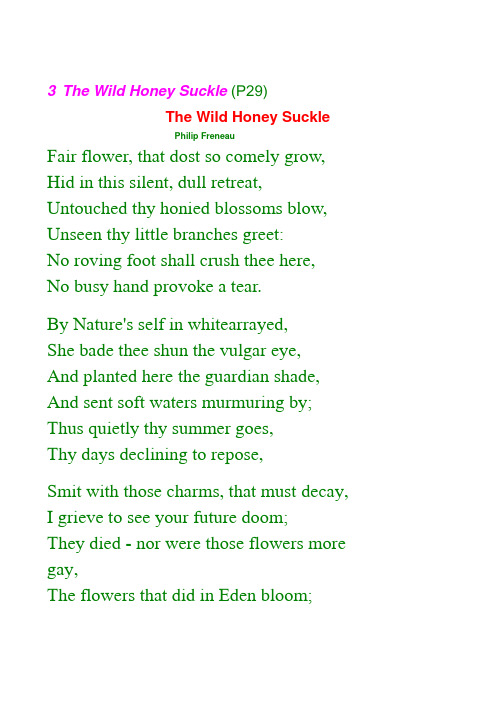
3 The Wild Honey Suckle(P29)The Wild Honey SucklePhilip FreneauFair flower, that dost so comely grow, Hid in this silent, dull retreat, Untouched thy honied blossoms blow, Unseen thy little branches greet:No roving foot shall crush thee here,No busy hand provoke a tear.By Nature's self in whitearrayed,She bade thee shun the vulgar eye,And planted here the guardian shade, And sent soft waters murmuring by; Thus quietly thy summer goes,Thy days declining to repose,Smit with those charms, that must decay, I grieve to see your future doom;They died - nor were those flowers more gay,The flowers that did in Eden bloom;Unpitying frosts, and Autumn's powerShall leave no vestige of this flower.From morning suns and evening dewsAt first thy little being came:If nothing once, you nothing lose,For when you die you are the same;The space between, is but an hour,The frail duration of a flower.1st stanza:The honey suckle lives an obscure, unknown, forgotten, serene, and safe life.2nd stanza:The pure, innocent honey suckle is not contaminated by the vulgar eye of people and protected, embraced, and nurtured by Nature.3rd stanza: grief upon the flower’s death4th stanza: nothing gained, nothing lost4. Success is counted sweetestSuccess is counted sweetestBy those who ne’er succeed.To comprehend a nectarRequires sorest need.Not one of all the purple HostWho took the Flag to-dayCan tell the definition,So clear, of victory,As he, defeated, dying,On whose forbidden earThe distant strains of triumphBurst agonized and clear!Interpretation:1. Only those who desire success most can tell howsweet it is; and people who easily obtain success can hardly realize what it really means.2. Even though the old-time fighters could not taste thesweetness of victory in all their life, they are thosewho know what success really is. Compared with the present easy success winners, they deserve more respect.3. In consideration of the poetess’s life experience andher temperament, here in this poem she may imply her determination to pursue or quest her ideal even though her value was not recognized at her time. That is to say, she firmly believes that even she was regarded as a loser at her time (few poems were published in her life), she herself clearly knows where she stands.4. In a broader sense, the little poem can serve as apiece of encouragement for those who are struggling for and pursuing their dreams and ideals---- if what you are fighting for is meaningful, don’t give up, no matter what the result is. The easy success is not so sweet.5. The Soul Selects Her Own SocietyThe Soul selects her own Society---Then---shuts the door---To her divine Majority---Present no more---Unmoved ---she motes the Chariots---pausing---At her low Gate---Unmoved---an Emperor be kneelingUpon her Mat---I’ve known her---from an ample nation---Choose One---Then---close the Valves or her attention---Like Stone---1) the soul made its choice and wanted no more. Thisshowed her resolution and determination.2) Unmoved by any other temptation3) Since I have made my choice, I will stick to it and willnever be tempted by other things.Soul, one: art , poetry, love, ideal。
Unit 14 F.Scott Fitzgerald
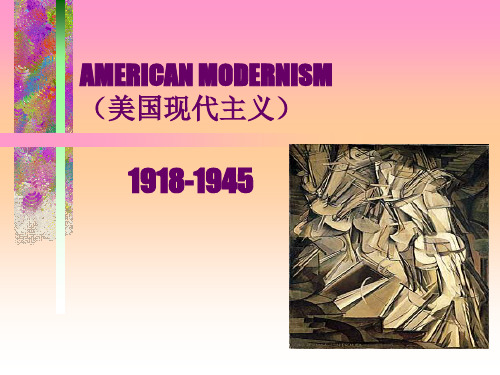
Hero, Plot
Anti-hero, Anti-plot
Tone
Optimistic
Pessimistic
The 1920s Introduction
• The 1920s is a flowering period of American literature. It is considered “the second renaissance” of American literature. The nicknames for this period:
• 1. Yong men and women in the 1920s had a sense of reckless (不顾后果的)confidence about money and life. They were lacking in responsibility and felt excused from seeking the common good. • 2. They could plunge themselves into personal adventures and engage themselves in casual sex and heavy drinking. They spent money extravagantly(挥 霍无度的). All that they kept in mind was to seek fun. They could throw themselves at parties, singing and dancing till early in the morning. • 3. But beneath their masks of relaxation, there was only sterility and meaninglessness, in fact the age was an era of decayed social and moral values and empty pursuit of pleasure.
英语诗歌欣赏Unit 14
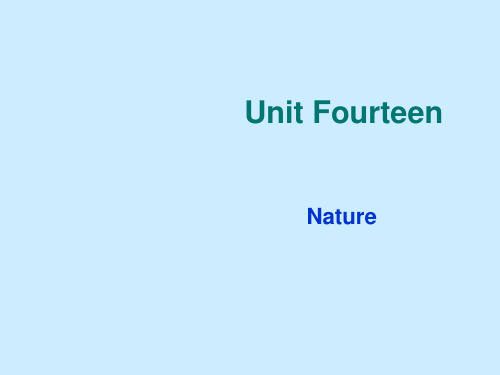
Chinese Version 春 春,甘美之春,一年之中的尧舜, 处处都有花树,都有女儿环舞, 微寒但觉清和,佳禽争着唱歌, 啁啁,啾啾,哥哥,割麦、插一禾! 榆柳呀山楂,打扮着田舍农家, 羊羔嬉游,牧笛儿整日价吹奏, 百鸟总在和鸣,一片悠扬声韵, 啁啁,啾啾,哥哥,割麦、插一禾! 郊原荡漾香风,雏菊吻人脚踵, 情侣作对成双,老妪坐晒阳光, 走向任何通衢,都有歌声悦耳, 啁啁,啾啾,哥哥,割麦、插一禾! 春!甘美之春! (郭沫若 译)
Appreciation The lyric portraits a lively scene of spring and expresses the joy brought by spring. The poet compares spring to the year’s pleasant king that views a harmonious picture of human and nature in the spring. Different kinds of people enjoy a leisurely and comfortable life in the beauty of spring. Simple and plain as the language is, the poem eulogizes the sweet spring with ingenious words, abundant images and concordant rhythms. What’s more, the poet employs various onomatopoeias to imitate the different sounds of some animals, which makes the poem vivid and imaginative.
大二下英语泛读UNIT14

Part 7: (17~20) : the right way of reading. (what?)
“We then see, what is always true, that, as the seer's hour of vision is short and rare among heavy days and months, so is its record, perchance, the least part of his volume. ” 于是,我们懂得了一个亘古不变的真理,就是说,在 漫长的岁月中,观察者有真知灼见的时刻既短暂又难 得,所以,有真知灼见的记录,在他的书中也许所占 比例最少。
UNIT14
The American scholar
The introduction of the author
Ralph Waldo Emerson,1803-1882, American poet and essayist, b. Boston. Through his essays, poems, and lectures, the "Sage of Concord" established himself as a leading spokesman of transcendentalism and as a major figure in American literature.
Part 5: (10~12) : the mind of past has the next great influence.
Books are the best type of the influence of the past A. because they were at first short-lived actions B. though they contain dead facts only C. since they come from life and can endure and inspire D. as they reveal the depth of the mind from which they were issued
美国文学选读作家-作品

美国文学选读作家-作品UNIT【1-10】本杰明·富兰克林(Benjamin Franklin,1706—1790)1732年,他用笔名发表了《格言历书》(Poor Richard's Almanac),内容除历书之外还附有谚语,格言、警句,非常畅销,后作为系列出版物发行25年。
《自传》(The Autobiography)著于1771年至1790年,较为全面、生动而深刻地记载了他个人的生活经历,历来被公认为美国文学中的经典之作。
埃德加·爱伦·坡(Edgar Allan Poe,1809—1849)《帖木尔》(Tamerlane and Other Poems),诗集《艾尔·阿拉夫》(Al Araaf, 1829)《诗集》(Poems, 1831)和《乌鸦及其他诗篇》(The Raven and Other Poems, 1845) ,短篇小说方面的成就更为显著,尤其长于创作哥特式的小说和侦探小说《述异集》(Tales of the Grotesque and Arabesque, 1840)《故事集》(Tales, 1845)《厄舍古厦的倒塌》(“ T he Fall of the House of Usher”)、《红色死亡假面舞会》(“ The Masque of the Red Death”)、《莉盖亚》(“Ligeia”)、《黑猫》(“ The Black Cat”)、《阿芒提拉多的酒桶》(“ The Cask of Amontillado”)、《莫格街谋杀案》(“ Murders in the Rue Morgue”)、《被窃的信件》(“ The Purloined Letter”)和《金甲虫》(“ The Gold Bug”)。
他的侦探小说情节常跌宕起伏, 诡谲多变,结局常常是在情理之中而又在意料之外,人物城府深邃,个性分明,历来为人称道,一般认为他是西方侦探小说的开山鼻祖。
Unit 14文学翻译如何再现原作的风格

What silence, too, came with the snow, and what seclusion! Every sound was muffled, every noise changed to something soft and musical. No more tramping hoofs, no more rattling wheels! Only the chiming of sleighbells, beating as swift and merrily as the hearts of children.
因为 “生者” 与 “逝者” 使人想到 “生生灭灭”的人类繁衍与消逝,与 时空的无限形成对照,而 “世人”有 芸芸众生,世俗之人的心理感受,它 与 “死者”一起用难以引导人们向哲 理的思考。同样, “在一片白茫茫之 中”,不如改为 “在一片洁白之中” ,
因为作者要追求的是一个纯净的世界 ,一个超尘脱俗的境界, “白茫茫” 难以含有这种心理内蕴,“白茫茫” 往往使人们联想到 “苍茫”,“茫然 ”,“空白”等,这与作者意欲传达 的意蕴不很相符。另外,在散文的结 尾部分,几个拟声词中最重要的一个 却在 “唯有雪橇的铃铛,奏出和谐的 乐声”一句中被忽略了。最好译为 “ 唯有雪橇叮咚的铃铛,奏出和谐的乐 声”,就更妙了。
福楼拜说过:“风格不但就是其人, 而且还是一个具体的、活生生的、有 血有肉的人。”由此可见,作家的风 格就是作家的精神面貌的显现,作家 的社会观、审美观和创作个性的表现 。作家的风格就是作家的形象,就是 作家作为社会人和艺术家的风貌。
作家的风格总是要具体地表现在 作品的语言形式中,也就是表 现在一定范围内的词语、句型 、修辞手法和艺术手法的性质 及其重复频率中。文学文本是 作者思想的表现形式。
美国文学14章

GHAPTER 14 Fitzgerald·Hemingway一.F.Scott Fitzgerald (1896-1940)1. He became part of the intellectual set, the Triangle Club. P2132. His first novel, This Side of Paradise人间天堂3. Flappers and Philosophers时髦女和哲学家which glittered with the image of the Fitzgerald as the symbol of an American ideal. P214 Tales of the Jazz Age爵士时代的故事which, like Mark Twain’s The Gilded Age,镀金时代gave its name to an important historical period in the history of the country.Fitzgerald became “the angel of the twenties”4. His second novel, The Beautiful and the Damned美与丑P215 Masterpiece: The Great Gatsby了不起的盖茨比Tender is the Night夜色温柔All the Sad Young Men一代悲哀的年轻人Taps at Reveille雷维尔的节拍声The Last Tycoon, 最后的大亨which he never finished.二.Ernest Hemingway (1899-1961) P2211. First novel, The Torrents of Spring春潮1926As a journalist, Hemingway trained himself in the economy of expression. 要求自己用词简洁Hemingway wrote all his life about one theme, which is neatly summed up in the famous phrase, “grace under pressure,”重压下的优雅2. In Our Time在我们的时代里P221Men Without Women 没有女人的男人Winner Take Nothing 胜者无所得3. First important novel: The Sun Also Rises太阳照常升起P222 Fitzgerald’s Tales of the Jazz Age becomes a symbol for an age; Hemingway’s book paints the image of a whole generation, the Lost Generation.迷惘的一代4. A Farewell to Arms永别的武器5. TERM: the Hemingway’s hero: an average man of decidedly masculine tastes, sensitive and intelligent, a man of action, and one of few words. That is an individualist, keeping emotions under control, stoic and self-disciplined in a dreadful place. These people are usually spiritual strong. People of certain skills, and most of them encounter death many times. P2236. Death in the Afternoon 午后之死Green Hills of Africa 非洲的青山7. the Hemingway hero possesses what Bertrand Russell terms “despairing courage”绝望的勇气P2248. For Whom the Bell Tolls丧钟为谁而鸣Across the River and into the Trees过河入林The Old Man and the Sea, about an old Cuban fisherman Santiago He won the Nobel Prize in 1954.9. In the latter part of his life, Hemingway came to be known as “Papa Hemingway.” This compliment refers in the main to his contribution to the development of a new style of writing in America, the colloquial style.口语化。
陶洁版 美国文学选读_第三版_课后习题答案.doc
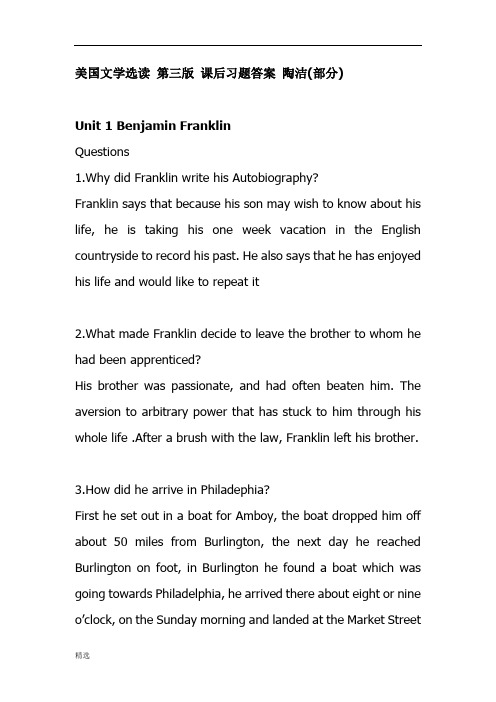
美国文学选读第三版课后习题答案陶洁(部分)Unit 1 Benjamin FranklinQuestions1.Why did Franklin write his Autobiography?Franklin says that because his son may wish to know about his life, he is taking his one week vacation in the English countryside to record his past. He also says that he has enjoyed his life and would like to repeat it2.What made Franklin decide to leave the brother to whom he had been apprenticed?His brother was passionate, and had often beaten him. The aversion to arbitrary power that has stuck to him through his whole life .After a brush with the law, Franklin left his brother.3.How did he arrive in Philadephia?First he set out in a boat for Amboy, the boat dropped him off about 50 miles from Burlington, the next day he reached Burlington on foot, in Burlington he found a boat which was going towards Philadelphia, he arrived there about eight or nine o’clock, on the Sunday morning and landed at the Market Streetwharf.4.What features do you find in the style of the above selection? It is the pattern of Puritan simplicity, directness, and concision(言简意赅). The narrative is lucid(易懂的), the structure is simple, the imagery is homely(朴素的).Unit 2 Edgar Allen Poe1.Who is the narrator? What wrong does he want to redress? Montresor.Fortunato, one of wine experts insulted him, so he wanted to murder him.2.What is the pretext he uses to lure Fortunato to his wine cellar?He baits Fortunato by telling him he has obtained what he believes to be a cask of Amontillado a rare and valuable sherry wine.Fortunato is anxious to determine whether or not it is truly Amontillado, so he goes to the vault with Montresor.3.What happens to Fortunato in the end?He was walled up alive behind bricks in a wine cellar.4.Describe briefly how Poe characterizes Montresor and Fortunato as contrasts?Poe uses color imagery to characterize them. Montresor face is covered in a black silk mask, In contrast, Fortunato dresses the motley-colored costume of the court fool, who gets literally and tragically fooled by Montresor's masked motives.The color schemes here represent the irony of Fortunato's death sentence.Through the acts, words, and thoughts of Fortunato,we know He is greedy, he was lured into the dark and somber vaults just because a cask of Amontillado.This is also due to his bad habit of bibulosity(酗酒). He lost himself on hearing the wine.At the same time, he was cheated by his enemy, which reflected his ignorance.When he heard the pretended compliment from Montresor, he became very boastful and arrogant.He was easily confused by the superficial phenomena and failed to watch out for others. He couldn’t tolerate that others werestronger than him.For example, Montresor always stimulated him with Luchresi who was good at connoisseur(鉴赏)in wine.Under the impulse of vanity, he fell into Montreso r’s terrible trap.In fact, he was careless and foolish and didn’t find that the danger was approaching him.He looked down upon Montresor and others.He didn’t realize his foolishness until the death was coming. Talking from the appearance, Monstresor was a well-educated and “kind” businessman.He enjoyed the honor and respect in the city. But in fact, he was an evil and awful person.His inner feelings were so cruel that they even made people tremble.Under his rich appearance was the dirty soul and despicable character.We couldn’t see any glorious virtues in his mind. Instead, his heart was cold and dark.It was the revenge that threw Montresor into the deep evil valley.unit 4 Nathaniel Hawthorne1.Why is the prison the setting of Chapter 1 ?No matter how optimistic the founders of new colonies may be, they are quick to establish a prison and a cemetery in their “Utopia,” for they know that misbehavior, evil, and death are unavoidable.This belief fits into the larger Puritan doctrine, which puts heavy emphasis on the idea of original sin—the notion that all people are born sinners because of the initial transgressions of Adam and Eve in the Garden of Eden. he is therefore using the prison building to represent the crime and the punishment which are aspect of civilized lifeWhat is the implication of the description of the roses?The rosebush symbolizes the ability of nature to endure and outlast man's activities.The narrator suggests that roses offer a reminder of Nature's kindness to the condemned; for his tale, he says, it will provide either a “sweet moral blossom” or else some relief in the face of unrelenting sorrow and gloom.2.Describe the appearance of Hester Prynne and the attitude of the people towards her.The second paragraph on page 30.The crowd in front of the jail is a mixture of men and women, all maintaining severe looks of disapproval.Several of the women begin to discuss Hester Prynne, and they soon vow that Hester would not have received such a light sentence for her crime if they had been the judges.One woman, the ugliest of the group, goes so far as to advocate death for Hester.3.What has happened to Hester?As a young woman, Hester married an elderly scholar, Chillingworth, who sent her ahead to America to live.While waiting for him, she had an affair with a Puritan minister named Dimmesdale, after which she gave birth to Pearl.The scarlet letter is her punishment for her sin and her secrecy. Why does she make the embroidery of the letter A so elaborate? It seems to declare that she is proud, rather than ashamed, of her sin.In reality, however, Hester simply accepts the “sin” and its symbol as part of herself, just as she accepts her child.And although she can hardly believe her present “realities,” she takes them as they are rather than resisting them or trying toatone for them.How does this tell us about her character?Throughout The Scarlet Letter Hester is portrayed as an intelligent, capable. It is the extraordinary circumstances shaping her that make her such an important figure.Unit5 Herman Melville1.What are the stories Ismael tells about Moby Dick? Ishmael compares the legend of Moby Dick to his experience of the whale.He notes that sperm whale attacks have increased recently and that superstitious sailors have come to regard these attacks as having an intelligent, even supernatural origin.In particular, wild rumors about Moby Dick circulate among whalemen, suggesting that he can be in more than one place at the same time and that he is immortal. Ishmael remarks that even the wildest of rumors usually contains some truth. Whales, for instance, have been known to travel with remarkable speed from the Atlantic to the Pacific; thus, it is possible for a whale to be caught in the Pacific with the harpoons of a Greenland ship in it.Moby Dick, who has defied capture numerous times, exhibits an “intelligent malignity”(狠毒)in his attacks on men2.Why does Ahab react so violently against the white whale? First, he lost one of his legs because of the white whale. Second,He considers Moby Dick the embodiment of evil in the world, and he pursues the White Whale,because he believes it his inescapable fate to destroy this evil.Ishmael suggests that Ahab is “crazy”and call him “a raving lunatic.” Do you agree with him? Why or why not?Ishmael describes Ahab as mad in his narration, and it does indeed seem mad to try to fight the forces of nature or God.3. What narrative features can you find in the selected chapter? In the selected charpter, Melville employed the technique of multiple view of his narrative to portray Moby Dick to achieve the effect of ambiguity and let readers judge the meaning.Unit 6 Henry David Thoreau1.Where indeed did Thoreau live, both at a physical level and ata spiritual level?He lived in a cabin on Walden Pond, which belonged to Emerson’s property.2.Had Thoreau ever bought a farm? Why did he enjoy the act of buying?No, he hadn’t.He avoided purchasing a farm because it would inevitably tie him down financially and complicate his life.Thoreau didn’t see the acquisition of wealth as the goal for human existence, he saw the goal of life to be an exploration of the mind and of the magnificent world around us.He regarded the places as an existence free of obligations and full of leisure.3.Is it significant that Thoreau mentioned the Fourth of July as the day on which he began to stay in the woods? Why? Yes, it is.Because The Fourth of July is known as Independence Day,the birthday ot the United States.Here Thoreau uses the day to express his beginningof regeneration at Walden.It also means a symbol of his conquest of being.4.How could you answer the question Thoreau asked at the end of this selection?Unit 7 19th Century American Poets1. Henry Wadsworth Longfellow(1) I Shot an Arrow…1. Why did the speaker lose sight of his arrow and song? The arrow flies too swiftly and too far away to be seen by the speaker; whereas the song is naturally invisible.2. In what circumstances did he find them again?He finds them unexpectedly years later from the trunk of a tree and the heart of a friend.3. What do arrow and song stand for in this poem?The images of arrow and song here may stand for friendship.(2) A Psalm of Life1. What kind of person is the speaker of this poem?The speaker is a man of action, always optimistic and cheerful, trying to achieve as much as possible in the short span of life.2. According to the poem, how should our lives be led to overcome the fact that each day brings us nearer to death? We should work harder and live happier.3. Interpret the metaphor of "Footprints on the sand of time" (line 28).The metaphor refers to human deeds in real life.2. Walt Whitman(1)One's Self I Sing1. What is the significance of singing about one's self?It is an exaltation of the individual spirit, which is typical of American people.2. What is the difference between physiology and physiognomy?Physiology is a science that deals with the functions and life process of human beings, whereas physiognomy refers to an art of judging character from contours of face itself or the appearance of a person.3. What does Whitman mean by the term of "the Modern Man"? He means that a man should be free from any prejudice and pride, totally different from the traditional one, that is full of bias.(3) O Captain! My Captain!1. Why is the word "Captain" capitalized throughout the poem?In this poem the word “Captain” specially refers to Abraham Lincoln, president of the United States.2. What overall metaphor does the poet employ in this poem? Life is a journey.3. Why do people on the shores exult and bells ring, while the speaker remains so sad?They welcome the ship returning from its hard trip, whereas the speaker is sad because the captain fails to receive his own honor.3.Emily Dickinson(1) To Make a Prairie …1. What things are needed to "make" a prairie? In what sense can one really do it?Some grass and insects and small animals. People can make a prairie with their imagination.2. How can "revery alone" create a prairie?The prairie stays in one's mind.(2) Success Is Counted Sweetest1. Why is success "counted sweetest by those who ne'er succeed"?Those who have tasted the bitterness of failure would have a keener desire for success.2. Who are "the purple host"?The so-called successful people in the world.3. Who is "he" in the last stanza?Anyone who is pursuing his success.(3) I'm Nobody!1. Who are the "pair of us" and "they" in this poem? The "pair of us" refers to the speaker in the poem and the reader, and "they" refers to the public, especially those in power.2. What does "an admiring bog" really mean?" (line 28).It Implies the vain and empty common people, who are always admiring and pursuing the celebrities.3. What is the theme of this poem?The real admirable life is a secluded and common one.4. Do you want to be "nobody" or "somebody"? Explain your reasons.Different persons would have different answers to this question. Personally, I prefer to be nobody.Unit 8 Mark Twain1: Why do you think Mr.Wheeler is so eager to tell these stories?From Mr.Wheeler’s behaviors and contents of his narration we can know he is so eager to tell these stories.First, when "I" asked him to tell "me" something about W.Smiley, he “ backed me into a corner and blockaded me with his chair, and then sat down a nd reeled off the narrative”. And during the process of telling his stories, he never paid any attention to others'response to his story and just went on telling what amused him. At last when the listener felt boring and wanted toleave, Mr.Wheeler even didn't notice it and still asked him to sit there listening to him.2: Does his audience share his enthusiasm in telling the stories? No. the audience does not show any interest in Mr.Wheeler’ stories. In fact, the narrator was very feverish about his stories, but ,in the eyes of the listener,the stories were very boring and had nothing to do with his preoccupation. As an educated man, the listener couldn't understand the way of laborers for joy, and he would never bother himself to understand it. So after the long time of Mr.Wheeler’ solo narration and when the audience got a chance, he fled away.3: Do you think the narrator and his listener ever suspect the presence of humor? Why? How do you interpret their interactions?The narrator and his listener never noticed or suspected the presence of humor.During the intercourse,the narrator went vigorously on his monotonous narrative "wihout a little smiling" talking about the animals and the things like ,while the listener felt rather puzzled or bothered by his stories.It seemed to bekind of coarse things. So the two different scenes go on separately without a intersection.And their interaction was a complete failure according toour common sense about communication.But it in this sense produced the effect of humor which can be tasted by our readers due to the skills adopted by Mark Twain .Unit 14 F·Scott Fitzgerald1.Do you think Gatsby deserves to be called “the great”? Why?(1)I think it is too complicated to simply say Gatsby deserves to be ―great‖or not.For one thing, Gatsby was ambitious, hardworking, generous and passionate. He was so extremely loyal to his love and Daisy that he could do anything to get Daisy back: he did shady business to earn money and social position; he threw luxurious parties just to draw Daisy’s attention; he could take the blame for a death that he did not cause.(2)In this respect, he is much ―greater‖than his contemporaries. For another thing, Gatsby never realized that Daisy wasn’t the girl he loved anymore. Gatsby was so innocent that he staked everything on his dreams, not realizingthat his dreams are unworthy of him. He wasn’t sober enough to be great.2.Does “the green light”Gatsby believed in exist in reality? Why or why not ?(1)I think ―the green light‖does not exist in reality. Because the green light which situated at the end of Daisy’s East Egg dock and barely visible from West Egg lawn represents Gatsby’s unattainable dream. Although the color itself can be seen as hope a nd bright future, Gatsby’s quest for Daisy back is doomed to be impossible. Daisy lived in ―a material world without being real, where poor ghosts, breathing dream like air‖.(2)After five years when Gatsby met Daisy again, the miracle Daisy had lost her original glory. Therefore, there is no delaying that Gatsby’s dream would not come true. In the novel, the green light not only represents that innocent Gatsby looked forward to the future, but also means his longing for the history –his happy past with Daisy. The distinction between ideal and reality was huge. As if American dream between golden past and golden future always suffered from the realistic betrayal and crush.3.What does Gatsby’s Schedule reveal about him and how does it relate to the American Dream?(1)The schedule is a reflection of Gatsby’s determination and ambition. It reveals that he is hard on himself in pursuit of his goal—to be an upper-class man.(2)On one hand, we can know that he is persistent in pursuing his American Dream-- to attain wealth and happiness through his struggle. On the other hand, he is too idealistic and naive.(3)He tries his best to make money and learns everything required to be an upper-class man so that he can get access to his beloved girl.Money is important,but there are other barriers difficult to penetrate. The girl he loves is as vulgar and superficial as others in her circle, she is unable to meets Gatsby’s romantic fantasy. So his dream is destined to shatter, which indicates the disillusion of American Dream.4.When you read the line “He (the man with owl-eyed glasses) took off his glasses and wiped them again, outside and in ,” what images does it create in your mind, given the novel’snumerous references to the strikingly strange scene of the spectacled eyes?(1)From this line , superficially, owl-eyes is a person with thick and blurry glasses who can not see clearly all the things in the world. However, we know he is actually an owl-wise observer and sees more clearly than anyone else in the novel. Owl-Eyes, except Nick, is the only friend to appear at the rain-soaked burial of Gatsby, when others are unwilling to come. He feels sympathy for Gatsby’s tragedy.(2)After reading this line, I cannot help thinking of the Dr.Eckleburg billboard with its huge yellow spectacles in this novel. In many rainy days, Dr. Eckleburg’s eyes are also dimmed and seem blind. But in fact this is a pair of "all-seeing" eyes. The Owl-Eyed Man is similar to Dr. Eckleburg, sadly looking at the people’s life and idealism of this time. B oth of them symbolize an uninvolved spectator god. They watch all the activities of the humans. Owl-eyes is the avatar of the sightless Dr. Eckleburg.Unit 16 Ernest Hemingway1. How do you interpret the irony of the title after reading the story?(1)The title ―A Clean Well-Lighted Place‖refers to the caf éin the text. The caféwas very clean and well- lighted. From the literary meaning, we may feel this place was very warm and comfortable, was a place where people need warmth wanted to go. So the old man, who was rich but deaf and lonely came here to find warmth and avoided nada. It was the only place he could go and could find some comfort.(2)However, the younger waiter was very selfish. As his wife was waiting him on the bed, he wanted to go home early. Therefore, he refused to offer the old man another cup of wine by the excuse that the business was finished. In fact, there was still an hour from closing time. The younger thought an hour was more important to him than to the old man. The old man needed to leave the only place where he could get far away from nada/ nothing. This café should be warm but the younger waiter forced the lonely and deaf to leave without any sympathy. This is the irony of the title.2. Do you think youth and confidence can help one withstand the metaphorical dark?Why or why not? (1)I don’t thinkso.In our opinion, the metaphorical dark means nada,nothing in one’s inner heart. In the article, the younger waiter had both youth and confidence; however, he never made full use of them. As we can see, he didn’t understand the old man’s suicide and excessive drinking, and failed to see his tomorrow through the old man’s present situation.(2)What’s more, he had no idea that youth is not permanent, which cannot guarantee love and work. From above, there is no denying that he didn’t realize his nada. Therefore, his youth and confidence never contributed to withstanding his metaphorical dark.(3)I think that, nowadays, youth and confidence do can help to withstand the metaphorical dark, for one can bravely face the reality and overcome the nada with youth and confidence. But they only serve as two main factors. In fact, we need some other factors such as courage, dignity and so on if we want to withstand the metaphorical dark successfully.3.The older waiter said to the younger waiter:“We are of two different kinds.”In what way do you think they are different?(1)I think they are different from each other in the following four aspects:In the beginning, they are in different ages.The older waiter was in his middle age; while the other was much younger.(2)Then, they have different attitudes towards the old man. From the article, we know the older waiter had suffered a lot. He had maintained a clean and well-lighted place in his heart, and he could understand the old man and show sympathy to him. However, the young man was very selfish. He wanted to go home early so that he finished the business one hour earlier and forced the old man to leave. He showed hatred rather than sympathy to the old man.(3)Next, they have different attitudes towards life. The older waiter had a deep sense of life. He was brave and wanted to fight again nada. Besides, he cared about others. The younger one was totally different; he has a shadow understanding of life. He satisfied with his present love and work, he only care about himself and was reluctant to take others into consideration. He even never thought of his future.(4)Finally, they have different attitudes towards nada. The older waiter had realized that it is imp ossible to avoid nada in one’s whole life. The only thing hecan do is to keep a kind of clearness in his own mind. So he was willing to work late for the lonely old man and was pleased to help those who are suffering nada. But out of youth and confidence, he failed to overcome nada. On the contrary, the younger waiter had the two most important factors for withstanding nada; however, he didn’t realize the nada in his heart at all. Then his youth and confidence became useless.Unit 17 20th -Century American Poets1. Ezra Pound In A Station of the Metro1. Why does the poet call the faces of pedestrians "apparition"?These pedestrians are all walking in a hurry amidst the drizzling rain.2. What do "petals" and "bough" stand for? Petals refer to the faces while the bough stands for the floating crowd.2. Wallace Stevens Anecdote of the Jar1. What does the jar in poem symbolize? Why does the speaker place it on top of a hill? The jar here symbolizes a certainperspective on looking at this world. If the perspective of the viewing is creative and unique, it will change the conventional order of the old world. When a new perspective comes out, it will certainly hold attention from the rest.2. The jar is "round" and "of a port in air," meaning that it has a stately importance. What effect does it have on surroundings when placed on the ground? Maybe the round jar assumes the air of a domineering figure, which helps to form a certain order out of the disordered surrounding.3. How did the wilderness of Tennessee characterized? What words or phrases does the poet use to describe it? Tennessee seems to a place full of life and energy. “Slovenly,” “sprawl” and “wild” are some of the words used to describe the place. (See Anecdote of the Jar )4.Robert Frost(1)Fire and Ice1. What are the symbolic meanings of fire in this poem? Fire symbolizes natural disaster, human passion, as well as war.2. Why does the speaker say that ice is also great for destruction? Explain what ice stands for here. Ice, oppose to fire, is also a dreadful natural disaster in this world, and ice is always related to indifference, coldness, hatred, and the other negative sentiments of human beings.3. What is your opinion about fire and ice? Which one is more destructive? Both fire and ice can destroy this beautiful world if they are beyond control of human beings. Therefore we should be open-minded and reduce our prejudice and pride so as to keep this world in peace.(2)Stopping By Woods On a Snowy Evening1. In your opinion, what was the reason that made the speaker stop by the woods on a snowy evening? The poet was deeply attracted by the natural beauty of the scene at that very moment.2. Why did the horse give the harness bell a shake? The horse grew impatient by stopping in the middle of the dark, cold woods at midnight. It was eager to go home.3. Why couldn't the speaker stay longer by the woods to appreciate its mysterious beauty? He realized that it was lateat night and he would have to hurry home to get some food and sleep, because the next morning he would have a lot of work to do.4. What is the effect of repetition in the last two lines? The refrain-like repetition in the last two lines reminds the reader a simple fact of life: whatever happens, one must go forward in the journey of his or her life.(3) The Road Not Taken1. What is the speaker's initial response to the divergence of the two roads? The speaker is at a loss which road he should choose, and he feels sorry that he cannot explore both roads at the same time.2. Describe the similarities and differences of these two roads. Which one does the speaker take? Two roads are similar except one of them is more “grassy,” which implies that it is less traveled by people. The speaker prefers the less traveled one, because he likes adventure.3. What might the two roads stand for in the speaker's mind? One road stands for the traditional one and the other is unconventional one and full of challenges and difficulties. Tofollow other people's footsteps or to open a new road for himself is really not an easy decision for us to make in our lives.Unit22 Allen GinsbergAll through the poem, the speaker is addressing to Walt Whitman. Is this poem about Walt Whitman or about modern America?-----from Allen Ginsberg A Supermarket in CaliforniaThe author in this poem wanted to emphasis his theme about showing his respect to the passed age and showing his worry about the corrupt in the part of spirit and society. As we all know, Walt Whitman’s poetry was a revolution in American literature can be seen in the first publication of Leaves of Grass in 1855. His poetry is “free verse” in that the lack of meter and rhyme is known as his major technical innovation. Allen Ginsberg had a highly praise on him. As the movement of Beat Generation, Allen Ginsberg used poetry as weapon to express his own understanding of Beat---beatific and beat down.In this poem, the author wrote the sentence “shopping for images”. What he wanted t o buy is the things which were listed by Walt Whitman many years ago. What is in the supermarket? The fresh fruits on the shelf fit the needs of customers and the families. We across a strange statement: shopping for images. How can we shop for images? What he refers to us is still the pure image---“dreaming of your enumerations”. The things on the shelf are the images of languages in Walt Whitman’s poetry. The language in Walt Whitman’s poetry and the spirit in his poetry are the things which Allen Ginsberg dreamed of. A young America which is full of energy is worth being praised. Allen Ginsberg found the song of himself, the song full of courage and the echo of the real world among Walt Whitman’s work. The meaning of age in this poem is that the nation or the race opens the age which belongs to them and creates the history of them own. To a certain extend, the age singer equals the national singer. The world is the world which has its features of timing and events. This means that the link of combining the world is not the same as the goods on the shelf but the things which contain the world and individual spirits.。
美国文学选读课后习题答案

美国⽂学选读课后习题答案Unit 1 Benjamin Franklin1.Why did Franklin write his Autobiography?Franklin says that because his son may wish to know about his life, he is taking his one week vacation in the English countryside to record his past. He also says that he has enjoyed his life and would like to repeat it2.What made Franklin decide to leave the brother to whom he had been apprenticed?His brother was passionate, and had often beaten him. The aversion to arbitrary power that has stuck to him through his whole life .After a brush with the law, Franklin left his brother.3.How did he arrive in Philadephia?First he set out in a boat for Amboy, the boat dropped him off about 50 miles from Burlington, the next day he reached Burlington on foot, in Burlington he found a boat which w as going towards Philadelphia, he arrived there about eight or nine o’clock, on the Sunday morning and landed at the Market Street wharf.4.What features do you find in the style of the above selection?It is the pattern of Puritan simplicity, directness, and concision(⾔简意赅). The narrative is lucid(易懂的), the structure is simple, the imagery is homely(朴素的).Unit 2 Edgar Allen Poe1.Who is the narrator? What wrong does he want to redress?Montresor.Fortunato,one of wine experts insulted him, so he wanted to murder him.2.What is the pretext he uses to lure Fortunato to his wine cellar?He baits Fortunato by telling him he has obtained what he believes to be a cask of Amontillado a rare and valuable sherry wine. Fortunato is anxious to determine whether or not it is truly Amontillado, so he goes to the vault with Montresor.3.What happens to Fortunato in the end?He was walled up alive behind bricks in a wine cellar.Unit 4 Nathaniel Hawthorne:1.Why is the prison the setting of Chapter 1 ?No matter how optimistic the founders of new colonies may be, they are quick to establish a prison and a cemetery in their “Utopia,” for they know that misbehavior, evil, and death are unavoidable.This belief fits into the larger Puritan doctrine, which puts heavy emphasis on the idea of original sin—the notion that all people are born sinners because of the initial transgressions of Adam and Eve in the Garden of Eden. he is therefore using the prison building to represent the crime and the punishment which are aspect of civilized life. What is the implication of the description of the roses?The rosebush symbolizes the ability of nature to endure and outlast man's activities. The narrator suggests that roses offer a reminder of Nature's kindness to the condemned; for his tale, he sa ys, it will provide either a “sweet moral blossom” or else some relief in the face of unrelenting sorrow and gloom.2.Describe the appearance of Hester Prynne and the attitude of the people towards her.The second paragraph on page 30.The crowd in front of the jail is a mixture of men and women, all maintaining severe looks of disapproval. Several of the women begin to discuss Hester Prynne, and they soon vow that Hester would not have received such a light sentence for her crime if they had been the judges. One woman, the ugliest of the group, goes so far as to advocate deathfor Hester.3.What has happened to Hester? As a young woman, Hester married an elderly scholar, Chillingworth, who sent her ahead to America to live. While waiting for him, she had an affair with a Puritan minister named Dimmesdale, after which she gave birth to Pearl. The scarlet letter is her punishment for her sin and her secrecy. Why does she make the embroidery of the letter A so elaborate?It seems to declare that she is proud, rather than ashamed, of her sin. In reality, however, Hester simply accepts the “sin” and its symbol as part of herself, just as she accepts her child. And although she can hardly believe her present “realities,” she takes them as they are rather than resisting them or trying to atone for them. How does this tell us about her character? Throughout The Scarlet Letter Hester is portrayed as an intelligent, capable. It is the extraordinary circumstances shaping her that make her such an important figure.Unit 6 Henry David Thoreau1. Where indeed did Thoreau live, both at a physical level and at a spiritual level? He lived in a cabin on Walden Pond,which belonged t o Emerson’s property.2.Had Thoreau ever bought a farm? Why did he enjoy the act of buying? No, he h adn’t. He avoided purchasing a farm because it would inevitably tie him down financially and complicate his life. Thoreau didn’t see the acquisition of wealth as the goal for human existence, he saw the goal of life to be an exploration of the mind and of the magnificent world around us. He regarded the places as an existence free of obligations and full of leisure.3. Is it significant that Thoreau mentioned the Fourth of July as the day on which he began to stay in the woods? Why? Yes, it is. Because The Fourth of July is known as Independence Day, the birthday of the United States. Here Thoreau uses the day to express his beginning of regeneration at Walden. It also means a symbol of his conquest of being.Unit 7 19th Century American Poets1. Henry Wadsworth Longfellow(1) I Shot an Arrow…1. Why did the speaker lose sight of his arrow and song?The arrow flies too swiftly and too far away to be seen by the speaker; whereas the song is naturally invisible.2. In what circumstances did he find them again?He finds them unexpectedly years later from the trunk of a tree and the heart of a friend.3. What do arrow and song stand for in this poem?The images of arrow and song here may stand for friendship.(2) A Psalm of Life1. What kind of person is the speaker of this poem?The speaker is a man of action, always optimistic and cheerful, trying to achieve as much as possible in the short span of life.2. According to the poem, how should our lives be led to overcome the fact that each day brings us nearer to death?We should work harder and live happier.3. Interpret the metaphor of "Footprints on the sand of time" (line 28).The metaphor refers to human deeds in real life.2. Walt Whitman(1) One’s Self I Sing1. What is the significance of singing about one's self? It is an exaltation of the individual spirit, which is typical of American people.2. What is the difference between physiology and physiognomy?Physiology is a science that deals with the functions and life process of human beings, whereas physiognomy refers to an art of judging character from contours of face itself or the appearance of a person.3. What does Whitman mean by the term of "the Modern Man"?He means that a man should be free from any prejudice and pride, totally different from the traditional one that is full of bias.(3) O Captain! My Captain!1. Why is the word "Captain" capitalized throughout the poem?In this poem the word “Captain” specially refers to Abraham Lincoln, president of the United States.2. What overall metaphor does the poet employ in this poem? Life is a journey.3. Why do people on the shores exult and bells ring, while the speaker remains so sad?They welcome the ship returning from its hard trip, whereas the speaker is sad because the captain fails to receive his own honor.3. Emily Dickinson(1) To Make a Prairie …1. What things are needed to "make" a prairie? In what sense can one really do it?Some grass and insects and small animals. People can make a prairie with their imagination. 2. How can "revery alone" create a prairie?The prairie stays in one's mind.(2) Success Is Counted Sweetest1. Why is success "counted sweetest by those who ne'er succeed"?Those who have tasted the bitterness of failure would have a keener desire for success.2. Who are "the purple host"?The so-called successful people in the world.3. Who is "he" in the last stanza? Anyone who is pursuing his success.(3)I'm nobody!1. Who are the "pair of us" and "they?"in this poem? The "pair of us" refers to the speaker in the poem and the reader, and "they" refers to the public, especially those in power.2. What does "an admiring bog" really mean?" (line 28). It implies the vain and empty common people, who are always admiring and pursuing the celebrities.3. What is the theme of this poem?The real admirable life is a secluded and common one.4. Do you want to be "nobody" or "somebody"? Explain your reasons. Different persons would have different answers to his question. Personally, I prefer to be nobody.Unit8 mark twainQuestions1: Why do you think Mr. Wheeler is so eager to tell these stories?From Mr. Wheeler’s behaviors and contents of his narration. First, when "I" asked him to tell "me" something about W. Smiley, he “backed me into a corner and blockaded me with his chair, and then sat down and reeled off the narrative”. And during the process of telling his stories, he never paid any attention to others' response to his story and just went on telling what amused him. At last when the listener felt boring and wanted to leave, Mr. Wheeler even didn't notice it and still asked him to sit there listening to him.Question2: Does his audience share his enthusiasm in telling the stories?No. the audience does not show any interest in Mr. Wheeler’ stories. In fact, the narrator was very feverish about his stories, but, in the eyes of the listener, the stories were very boring and had nothing to do with his preoccupation. As an educated man, the listener couldn't understand the way of laborers for joy, and he would never bother himself to understand it. So after the longtime of Mr. Wheeler’ solo narration and when the audience got a chance, he fled away. Question3: Do you think the narrator and his listener ever suspect the presence of humor? Why? How do you interpret their interactions?The narrator and his listener never noticed or suspected the presence of humor. During the intercourse, the narrator went vigorously on his monotonous narrative "without a little smiling" talking about the animals and the things like, while the listener felt rather puzzled or bothered by his stories. It seemed to be kind of coarse things. So the two different scenes go on separately without an intersection. And their interaction was a complete failure according tour common sense about communication. But it in this sense produced the effect of humor which can be tasted by our readers due to the skills adopted by Mark Twain .Unit14 The Great GatsbyDo you think G atsby deserv es to be called “the great”? Why?(1)I think it is too complicated to simply say Gatsby deserves to be ―great‖or not.For one thing, Gatsby was ambitious, hardworking, generous and passionate. He was so extremely loyal to his love and Daisy that he could do anything to get Daisy back. In this respect, he ismuch ―greater‖ than his contemporaries. For another thing, Gatsby never realized that Daisy wasn’t the girl he loved anymore. Gatsby was so innocent that he staked everything on his dreams, not realizing that his dreams are unworthy of him. He wasn’t sober enough to be great. 2.Does “the green light” Gatsby believed in exist in reality? Why orwhy not ?(1)I think ―the green light‖does not exist in reality. Because the green light which situated at th e end of Daisy’s East Egg dock and barely visible from West Egg lawn represents Gatsby’s unattainable dream. Although the color itself can be seen as hope and bright future, Gatsby’s quest for Daisy back is doomed to be impossible. Daisy livedin ―a materi al world without being real, where poor ghosts, breathing dream like air‖. The distinction between ideal and reality was huge. As if American dream between golden past and golden future always suffered from the realistic betrayal and crush.3.What does Gats by’s Schedule reveal about him and how does it relate to the American Dream?(1)The schedule is a reflection of Gatsby’s determination and ambition. It reveals that he is hard on himself in pursuitof his goal—to be an upper-class man.(2)On one hand, we can know that he is persistent in pursuing his American Dream-- to attain wealth and happiness through his struggle. On the other hand, he is too idealistic and naive. The girl he loves is as vulgar andsuperficial as others in her circle, she is unable to meetsGatsby’s romantic fantasy. So his dream is destined to shatter,which indicates the disillusion of American Dream. 4.Whenyou read the line “He (the man with owl-eyed glasses)took off his glasses and wiped them again, outside andin ,” what images does it create in your mind, given thenovel’s numerous references to the strikingly strangescene of the spectacled eyes?(1)From this line , superficially, owl-eyes is a person with thick and blurry glasses who can not see clearly all the things in the world. However, we know he is actually an owl-wise observer and sees more clearly than anyone else in the novel. Owl-Eyes, except Nick, is the only friend to appear at the rain-soaked burial of Gatsby, when others are unwilling to come. He feels sympathy for Gat sby’s tragedy.Unit 16 Ernest Hemingway1.How do you interpret the irony of the title after readingthe story?(1)The title ―A Clean Well-Lighted Place‖ refers to thecaféin the text. The caféwas very clean and well- lighted.From the literary meaning, we may feel this place was verywarm and comfortable, was a place where people needwarmth wanted to go. So the old man, who was rich butdeaf and lonely came here to find warmth and avoided nada.It was the only place he could go and could find somecomfort.(2)However, the younger waiter was very selfish.Therefore, he refused to offer the old man another cup ofwine by the excuse that the business was finished. This caféshould be warm but the younger waiter forced the lonely anddeaf to leave without any sympathy. This is the irony of thetitle.2.Do you think youth and confidence can help onewithstand the metaphorical dark?Why or why not?(1)I don’t think so.In our opinion, the m etaphorical darkmeans nada,nothing in one’s inner heart. In the article, the younger waiter had both youth and confidence; however, he never made full use of them. As we can see, he didn’t understand the old man’s suicide and excessive drinking, and failed to see his tomorrow through the old man’s present situation.3.The older wait er said to the younger waiter:“We are of two different kinds.” In what way do you think they are different? (1)I think they are different from each other in the following four aspects:In the beginning, they are in different ages.The older waiter was in his middle age; while the other was much younger.(2)Then, they have different attitudes towards the old man. From the article, the older waiter could understand the old manand show sympathy to him. However, the young man was very selfish. He showed hatred rather than sympathy to the old man.(3)Next, they have different attitudes towards life. The older waiter had a deep sense of life. He was brave and wanted to fight again nada. Besides, he cared about others. he has a shadow understanding of life. He satisfied with his present love and work, he only care about himself. He even never thought of his future.(4)Finally, they have different attitudes towards nada. The older waiter had realized that it is impossible to avoid nada in one’s whole life. The only thing h e can do is to keep a kind of clearness in his own mind. But out of youth and confidence, he failed to overcome nada. On the contrary, the younger waiter had the two most important factors for withstanding nada; however, he didn’t realize the nada in his heart at all. Then his youth a nd confidence became useless.Unit 17 20th -Century American Poets1.Ezra Pound In A Station of the Metro1.Why does the poet call the faces of pedestrians "apparition"?These pedestrians are all walking in a hurry amidst the drizzling rain. What do "petals" and "bough" stand for? Petals refer to the faces while the bough stands for the floating crowd.2.Wallace Stevens Anecdote of the Jar1.What does the jar in poem symbolize? Why does the speaker place it on top of a hill?The jar here symbolizes a certain perspective on looking at this world. If the perspective of the viewing iscreative and unique, it will change the conventional order of the old world. When a new perspective comes out, it will certainly hold attention from the rest.2. The jar is "round" and "of a port in air," meaning that it has a stately importance. What effect does it have on surroundings when placed on the ground? Maybe the round jar assumes the air of a domineering figure, which helps to form a certain order out of the disordered surrounding.3. How did the wilderness of Tennessee characterized? What words or phrases does the poet use to describe it?Tennessee seems to a place full of life and energy. “Slovenly,” “sprawl” and “wild” are some of the words used to describe the place. (See Anecdote of the Jar ) 3.Robert Frost(1)Fire and Ice 1. What are the symbolic meanings of fire in this poem? Fire symbolizes natural disaster, human passion, as well as war. 2. Why does the speaker say that ice is also great for destruction? Explain what ice stands for here. Ice, oppose to fire, is also a dreadful natural disaster in this world, and ice is always related to indifference, coldness, hatred, and the other negative sentiments of human beings. 3. What is your opinion about fire and ice? Which one is more destructive? Both fire and ice can destroy this beautiful world if they are beyond control of human beings. Therefore we should be open-minded and reduce our prejudice and pride so as to keep this world in peace.(2)Stopping By Woods On a Snowy Evening 1. In your opinion, what was the reason that made the speaker stop by the woods on a snowy evening? The poet was deeply attracted by the natural beauty of the scene at that very moment. 2. Why did the horse give the harness bell a shake? The horse grew impatient by stopping in the middle of the dark, cold woods at midnight. It was eager to go home.3. Why couldn't the speaker stay longer by the woods to appreciate its mysterious beauty? He realized that it was late at night and he would have to hurry home to get some food and sleep, because the next morning he would have a lot of work to do.4. What is the effect of repetition in the last two lines? The refrain-like repetition in the last two lines reminds the reader a simple fact of life: whatever happens, one must go forward in the journey of his or her life.(3) The Road Not Taken 1. What is the speaker's initial response to the divergence of the two roads? The speaker is at a loss which road he should choose, and he feels sorry that he cannot explore both roads at the same time. 2. Describe the similarities and differences of these two roads. Which one does the speaker take?Two roads are similar except one of them is more “grassy,” which impl ies that it is less traveled by people. The speaker prefers the less traveled one, because he likes adventure. 3. What might the two roads stand for in the speaker's mind? One road stands for the traditional one and the other is unconventional one and full of challenges and difficulties. To follow other people's footsteps or to open a new road for himself is really not an easy decision for us to make in our lives.。
高教版美国文学选读-陶洁 翻译(吐血整理)
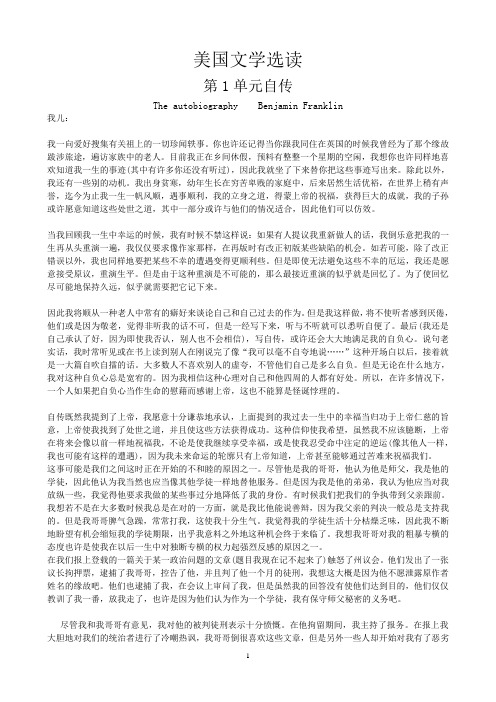
美国文学选读第1单元自传The autobiography Benjamin Franklin我儿:我一向爱好搜集有关祖上的一切珍闻轶事。
你也许还记得当你跟我同住在英国的时候我曾经为了那个缘故跋涉旅途,遍访家族中的老人。
目前我正在乡间休假,预料有整整一个星期的空闲,我想你也许同样地喜欢知道我一生的事迹(其中有许多你还没有听过),因此我就坐了下来替你把这些事迹写出来。
除此以外,我还有一些别的动机。
我出身贫寒,幼年生长在穷苦卑贱的家庭中,后来居然生活优裕,在世界上稍有声誉,迄今为止我一生一帆风顺,遇事顺利,我的立身之道,得蒙上帝的祝福,获得巨大的成就,我的子孙或许愿意知道这些处世之道,其中一部分或许与他们的情况适合,因此他们可以仿效。
当我回顾我一生中幸运的时候,我有时候不禁这样说:如果有人提议我重新做人的话,我倒乐意把我的一生再从头重演一遍,我仅仅要求像作家那样,在再版时有改正初版某些缺陷的机会。
如若可能,除了改正错误以外,我也同样地要把某些不幸的遭遇变得更顺利些。
但是即使无法避免这些不幸的厄运,我还是愿意接受原议,重演生平。
但是由于这种重演是不可能的,那么最接近重演的似乎就是回忆了。
为了使回忆尽可能地保持久远,似乎就需要把它记下来。
因此我将顺从一种老人中常有的癖好来谈论自己和自己过去的作为。
但是我这样做,将不使听者感到厌倦,他们或是因为敬老,觉得非听我的话不可,但是一经写下来,听与不听就可以悉听自便了。
最后(我还是自己承认了好,因为即使我否认,别人也不会相信),写自传,或许还会大大地满足我的自负心。
说句老实话,我时常听见或在书上读到别人在刚说完了像“我可以毫不自夸地说……”这种开场白以后,接着就是一大篇自吹自擂的话。
大多数人不喜欢别人的虚夸,不管他们自己是多么自负。
但是无论在什么地方,我对这种自负心总是宽宥的。
因为我相信这种心理对自己和他四周的人都有好处。
所以,在许多情况下,一个人如果把自负心当作生命的慰藉而感谢上帝,这也不能算是怪诞悖理的。
陶洁《美国文学选读》(第2版)课后习题详解(第14单元 弗
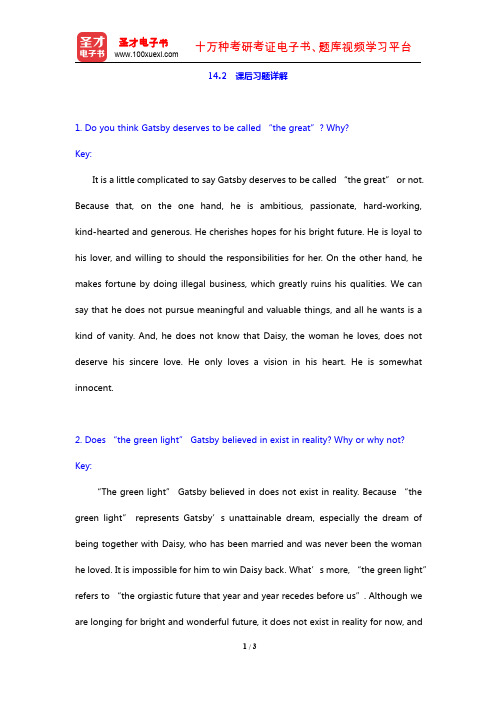
14.2课后习题详解1.Do you think Gatsby deserves to be called“the great”?Why?Key:It is a little complicated to say Gatsby deserves to be called“the great”or not. Because that,on the one hand,he is ambitious,passionate,hard-working, kind-hearted and generous.He cherishes hopes for his bright future.He is loyal to his lover,and willing to should the responsibilities for her.On the other hand,he makes fortune by doing illegal business,which greatly ruins his qualities.We can say that he does not pursue meaningful and valuable things,and all he wants is a kind of vanity.And,he does not know that Daisy,the woman he loves,does not deserve his sincere love.He only loves a vision in his heart.He is somewhat innocent.2.Does“the green light”Gatsby believed in exist in reality?Why or why not? Key:“The green light”Gatsby believed in does not exist in reality.Because“the green light”represents Gatsby’s unattainable dream,especially the dream of being together with Daisy,who has been married and was never been the woman he loved.It is impossible for him to win Daisy back.What’s more,“the green light”refers to“the orgiastic future that year and year recedes before us”.Although we are longing for bright and wonderful future,it does not exist in reality for now,andit is a kind of mysterious nonexistence.3.What does Gatsby’s Schedule reveal about him and how does it relate to the American Dream?Key:Gatsby’s schedule reveals his ambitions and determination to be successful. He is strict with himself and has a sense of self-control.In order to gain wealth and social statues,he made himself such a detailed and meticulous schedule.It is the very American Dream,to gain wealth and statues,that drives him to make his schedule and work hard regardless of what kind of means he uses to make it come true.4.When you read this line”He(the man with owl—eyed glasses)took off his glasses and wiped them again,outside and in,”what image does it create in your mind,given the novel’s numerous references to the strikingly strange scene of the spectacled eyes?Key:When I read this line,I think that the man with thick and blurry owl-eyed glasses cannot see clearly all the things in the world.However,he is actually an owl-wise observer and sees more clearly that anyone else in the novel.This man, except Nick,is the only friend to appear at the funeral of Gatsby.He is a man of sympathetic.Throughout this novel,we also find that Dr.Eckleburg billboard alsohas its huge yellow spectacles.In many rainy days,Dr.Eckleburg’s eyes are also dimmed and seem blind.But,in fact,it is a pair of“all-seeing”eyes,observing what happens in the world.The owl-eyed man is similar to Dr.Eckleburg,sadly looking at the people’s life and idealism of this time.Both of them symbolize an uninvolved spectator,the God.。
《美国文学史》各章节知识点指南
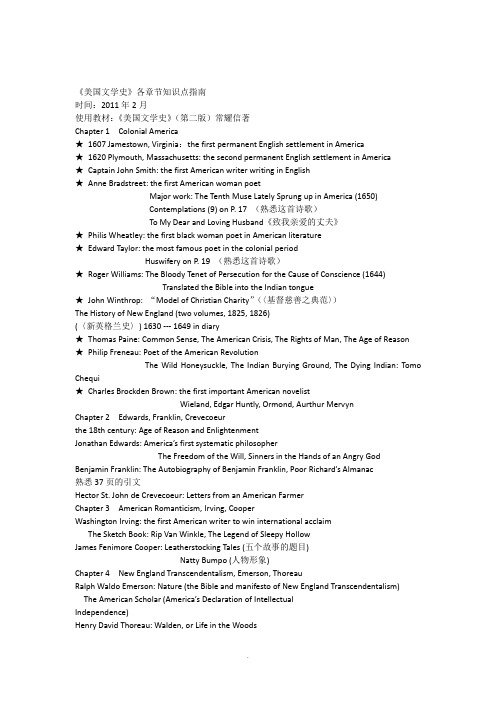
《美国文学史》各章节知识点指南时间:2011年2月使用教材:《美国文学史》(第二版)常耀信著Chapter 1 Colonial America★1607 Jamestown, Virginia:the first permanent English settlement in America★1620 Plymouth, Massachusetts: the second permanent English settlement in America★Captain John Smith: the first American writer writing in English★Anne Bradstreet: the first American woman poetMajor work: The Tenth Muse Lately Sprung up in America (1650)Contemplations (9) on P. 17 (熟悉这首诗歌)To My Dear and Loving Husband《致我亲爱的丈夫》★Philis Wheatley: the first black woman poet in American literature★Edward Taylor: the most famous poet in the colonial periodHuswifery on P. 19 (熟悉这首诗歌)★Roger Williams: The Bloody Tenet of Persecution for the Cause of Conscience (1644)Translated the Bible into the Indian tongue★John Winthrop: “Model of Christian Charity”(〈基督慈善之典范〉)The History of New England (two volumes, 1825, 1826)(〈新英格兰史〉) 1630 --- 1649 in diary★Thomas Paine: Common Sense, The American Crisis, The Rights of Man, The Age of Reason★Philip Freneau: Poet of the American RevolutionThe Wild Honeysuckle, The Indian Burying Ground, The Dying Indian: Tomo Chequi★Charles Brockden Brown: the first important American novelistWieland, Edgar Huntly, Ormond, Aurthur MervynChapter 2 Edwards, Franklin, Crevecoeurthe 18th century: Age of Reason and EnlightenmentJonathan Edwards: America’s first systematic ph ilosopherThe Freedom of the Will, Sinners in the Hands of an Angry God Benjamin Franklin: The Autobiography of Benjamin Franklin, Poor Richard’s Almanac熟悉37页的引文Hector St. John de Crevecoeur: Letters from an American FarmerChapter 3 American Romanticism, Irving, CooperWashington Irving: the first American writer to win international acclaimThe Sketch Book: Rip Van Winkle, The Legend of Sleepy HollowJames Fenimore Cooper: Leatherstocking Tales (五个故事的题目)Natty Bumpo (人物形象)Chapter 4 New England Transcendentalism, Emerson, ThoreauRalph Waldo Emerson: Nature (the Bible and manifesto of New England Transcendentalism)The American Scholar (America’s Declaration of IntellectualIndependence)Henry David Thoreau: Walden, or Life in the WoodsChapter 5 Hawthorne, MelvilleNathaniel Hawthorne: The Scarlet Letter, Twice-Told Tales, The House of the Seven Gables, The Blithedale Romance, The Marble Faun, Young Goodman BrownHerman Melville: Moby Dick, Omoo, Mardi, Redburn, White Jacket, PierreChapter 6 Whitman, DickinsonWalt Whitman: Leaves of Grass; free verse; Song of MyselfEmily Dickinson: Of the 1775 poems, only 7 poems were published in her lifetime.熟悉教材中98至102页所选的诗歌Chapter 7 Edgar Allan Poe★Edgar Allan Poe: The Fall of the House of Usher, The Philosophy of Composition, The Poetic Principle, The Raven,To Helen熟悉教材中107页所选的The Raven中的部分诗行Chapter 8 The Age of Realism, Howells, JamesWilliam Dean Howells: The Rise of Silas Lapham, Criticism and FictionHenry James: important writings listed on P. 125the international themeChapter 9 Local Colorism, Mark TwainHamlin Garland: Crumbling Idols, Veritism (真实主义)Bret Harte: The Luck of Roaring CampMark Twain: 主要作品, vernacular literature, colloquial styleHarriet Beecher Stowe 斯托夫人& her Uncle Tom’s Cabin《汤姆叔叔的小屋》Louisa May Alcott 路易莎·梅·奥尔科特& her Little Women 《小妇人》Kate Chopin 凯特·肖班& her The Awakening 《觉醒》Chapter 10 American Naturalism, Crane, Norris, Dreiser, RobinsonStephen Crane: Maggie: A Girl of the Streets (the first naturalistic novel in American literature), The Red Badge of Courage (the first anti-war novel in American literature),Famous short stories: The Open Boat, The Bride Comes to the Yellow SkyFrank Norris: The Octopus, McTeagueTheodore Dreiser: Sister Carrie, Jennie Gerhardt, the Desire Trilogy, The GeniusEdwin Arlington Robinson: Richard CoryJack London: The Call of the Wild, White Fang, The Sea Wolf, Martin EdenO. Henry (William Sidney Porter): famous for his short stories such as The Gift of the Magi Upton Sinclair: The Jungle, the Muckraking MovementChapter 11 The 1920s, Imagism, PoundThe first American Renaissance: the first half of the 19th centuryThe second Renaissance: the 1920sThe three principles of the Imagist Poetry熟悉四首意象派诗歌:In a Station of the Metro, Oread, The Red Wheelbarrow, Fog, 并会分析其中的第一和第四首Ezra Pound: The Cantos, Hugh Selwyn MauberleyChapter 12 T. S. Eliot, Stevens, WilliamsT. S. Eliot: The Waste Land (五个部分的题目), The Love Song of J. Alfred Prufrock其他主要作品founder of New Criticism: depersonalization, objective correlativeWilliam Carlos Williams: PatersonChapter 13 Frost, Sandburg, Cummings, Hart Crane, Moore★Robert Frost: New England poet, lyrical poet, the unofficial poet laureate, won the Pulitzer Prize four timesThe Road Not Taken (熟悉此诗), Stopping by Woods on a Snowy Evening, Mending Wall, Apple-picking <<摘苹果>>Carl Sandburg: Fog, The Harbor (two famous Imagist poems)E. E. Cummings: the most interesting experimentalist in modern American poetryHart Crane: The BridgeChapter 14 Fitzgerald, Hemingway★F. Scott Fitzgerald: the spokesman of the Jazz AgeThe Great GatsbyErnest H emingway: Hemingway hero with “grace under pressure”, the iceberg principle“I always try to write on the principle of the iceberg. There is seven-eights of it under water for every part that shows. Anything you know you can eliminate and it only strengthens your iceberg. It is the part that doesn’t show. ”冰山运动之雄伟壮观,是因为它只有八分之一在水面上。
美国文学14Robert Forst
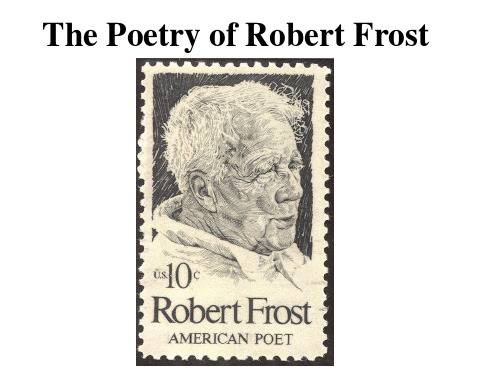
I. Life Experience 1.1Early Life
• Robert Frost was born in San Francisco, California on March 26, 1874. – Grandfather: a prudent, hard-working, successful Massachusetts farmer – Father: rebelled so violently against the New England mores that he embraced the Confederate cause during the Civil War – Mother: a school teacher
ቤተ መጻሕፍቲ ባይዱ
• In 1895 , married his high school sweetheart Elinor
1.3 Dark Years
• Elliott, their first child, was born on September 29, 1896. Elliott's death, from cholera, in July of 1900, was the first of many family tragedies that Frost would endure. Between 1899 and 1907, Elinor and Robert had five more children--another son, Carol, and four daughters, the last of whom lived for only three days. Frost's mother also died in 1900, of cancer. The following year saw the death of his grandfather, William Prescott Frost, Sr., who left his grandson a yearly annuity of $500.00 (a substantial amount at the time) and the use of his farm in Derry, New Hampshire, for a period of ten years, after which Robert would become its owner.
美国文学选读第三版unit14翻译
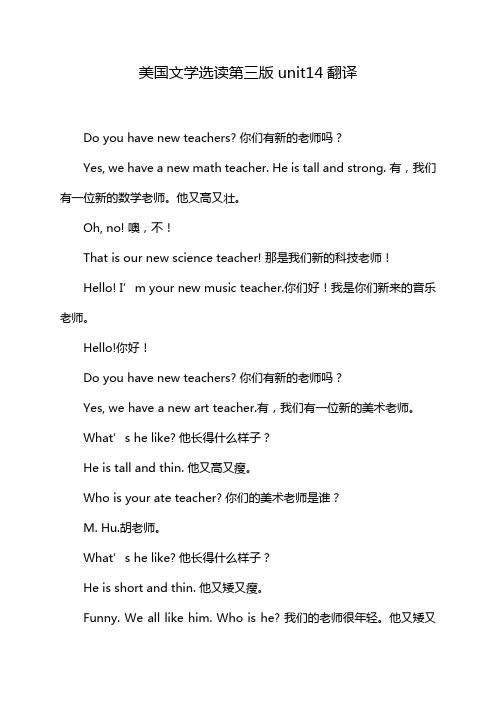
美国文学选读第三版unit14翻译Do you have new teachers? 你们有新的老师吗?Yes, we have a new math teacher. He is tall and strong. 有,我们有一位新的数学老师。
他又高又壮。
Oh, no! 噢,不!That is our new science teacher! 那是我们新的科技老师!Hello! I’m your new music teacher.你们好!我是你们新来的音乐老师。
Hello!你好!Do you have new teachers? 你们有新的老师吗?Yes, we have a new art teacher.有,我们有一位新的美术老师。
What’s he like? 他长得什么样子?He is tall and thin. 他又高又瘦。
Who is your ate teacher? 你们的美术老师是谁?M. Hu.胡老师。
What’s he like? 他长得什么样子?He is short and thin. 他又矮又瘦。
Funny. We all like him. Who is he? 我们的老师很年轻。
他又矮又瘦。
他很幽默风趣。
我们都喜欢他。
他是谁?Who is your math teacher? 你的数学老师是谁? Mr. Zhao. 赵老师。
What is he like? 他长得什么样子?He is short and thin. He is very kind. 他又瘦又矮。
他非常和蔼可亲。
I have there teachers. 我有三位新的老师。
Who are they? 他们是谁?A science teacher, an art teacher and an English teacher. 一位科学老师,一位美术老师和一位英语老师。
Who is your English teacher? 你们的英语老师是谁?Mr. Carter. He is from Canada. 卡特老师。
Unit 14 泛读
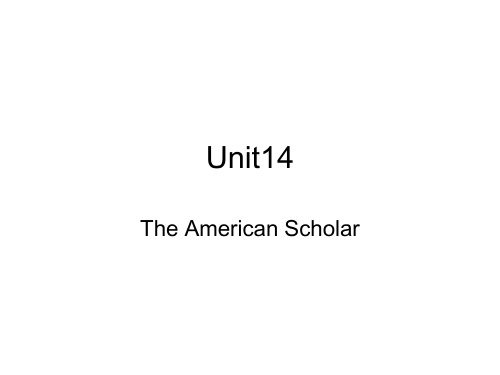
• Emerson's religious views were often considered radical at the time. He believed that all things are connected to God and, therefore, all things are divine. • His views, the basis of Transcendentalism, suggested that God does not have to reveal the truth but that the truth could be intuitively experienced directly from nature. • There is evidence suggesting that Emerson may have been bisexual. During his early years at Harvard, he found himself ―strangely attracted‖ to a young freshman named Martin Gay about whom he wrote sexually charged poetry. Gay would be only the first of his infatuations(痴迷对象)and interests, with Nathaniel Hawthorne numbered among them.
Nature
• Nature is an essay written by Ralph Waldo Emerson, published anonymously in 1836. It is in this essay that the foundation of transcendentalism (超验主义) is put forth, a belief system that espouses (信奉) a non-traditional appreciation of nature. Recent advances in zoology, botany, and geology confirmed Emerson's intuitions about the intricate relationships of Nature at large. A visit to the Muséum National d'Histoire Naturelle in Paris inspired a set of lectures delivered in Boston and subsequently the ideas leading to the publication of Nature. • Emerson defines nature as a paradise rather than being ruled by a superior being.
美国文学作家&考试要点
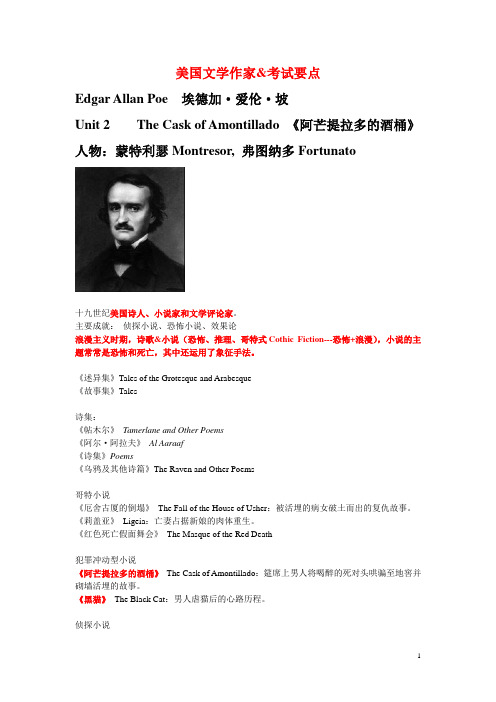
美国小说家,“迷惘的一代”作家的代表,冰山理论Iceberg Theory,作品结尾大多是开放式,自然主义Naturalism和象征表现Symbolism,虚无nada/nothing.
1953年凭《老人与海》获得普利策奖。
侦探小说
《被窃的信件》The Purloined Letter
《莫格街谋杀案》The Murders in the Rue Morgue
《金甲虫》The Gold-Bug
喜剧小说
理论著作
《创作哲学》The Philosophy of Composition
《诗歌原理》The Poetic Principle
《要描绘一片草原······》To Make a Prairie
《最美妙的胜利感觉》Success Is Counted Sweetest
《我是无名之辈》I'm Nobody!
Stephen Crane斯蒂芬·克莱恩
Unit 10 The Open Boat《海上扁舟》
人物:船长Captain,注油工Oiler(最后死了)
作品:
Maggie: A Girl of the Streets《街头女郎麦姬》
The Red Badge of Courage《红色英勇勋章》
The Open Boat《海上扁舟》
The Bride Comes to Yellow Sky《新娘来到黄天镇》
The Blue Hotel《蓝色旅店》
Katherine Anne Porter凯萨琳·安·波特
Tender is the Night《夜色温柔》
The Crack-up《崩溃》
美国文学第14章Fitzgerald
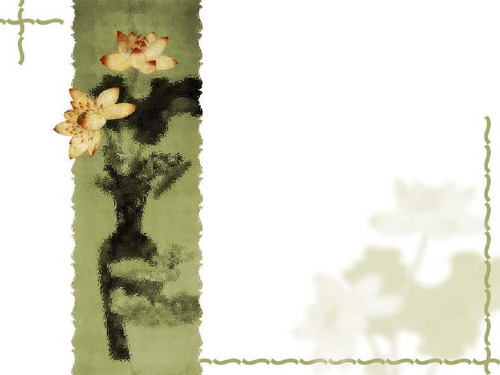
Born into a fairly well-to-do family in St Paul, Minnesota in 1896 Fitzgerald attended, but never graduated from Princeton University. Here he mingled with the monied classes from the Eastern Seaboard who so obsessed him for the rest of his life. In 1917 he was drafted into the army, but he never saw active service abroad. Instead, he spent much of his time writing and re-writing his first novel This Side of Paradise, which on its publication in 1920 became an instant success. In the same year he married the beautiful Zelda Sayre and together they embarked on a rich life of endless parties.
During the twenties, Hemingway became a member of the group of expatriate Americans in Paris, which he described in his first important work, The Sun Also Rises (1926). Equally successful was A Farewell to Arms (1929), the study of an American ambulance officer's disillusionment in the war and his role as a deserter.
